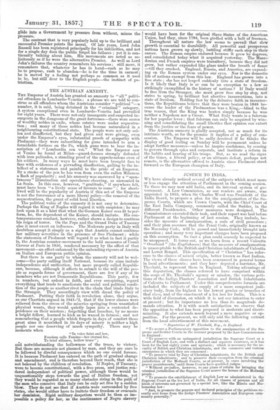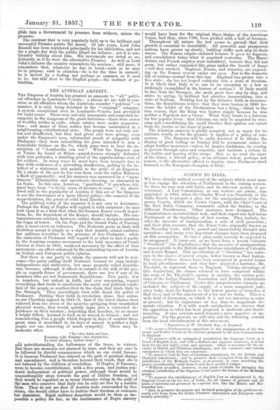JUSTICE TO INDIA.
WE have already noticed several of the subjects which must more or less engage the attention of Parliament in the coming session. To these we may now add India, and its internal system of government. A Law Commission as our readers are aware, was
appointed in 1853, when Sir diaries Wood was President of the India Board, to prepare a plan for the amalgamation of the Supreme Courts, which are Crown Courts, with the Chief Court of the East India Company, commonly called the Sadder, in the different Presidencies. Other measures were designed. The Commissioners executed their task, and their report was laid before Parliament at the beginning of last session. They include, besides the measure of amalgamation, a code of civil procedure ;
and their plan assumes that the Penal Code, originally known as the Macaulay Code, will be passed and immediately brought into operation ; and many very important changes have been proposed on this assumption. So vast a plan could scarcely be expected to be unopposed. It turns out, as we learn from a recentCalcutta " Overland " (the Englishman) that the measure of amalgamation is unacceptable to the British and Christian inhabitants of Calcutta and Lower Bengal. This specification of " Christian" has reference to the classes of mixed origin, better known as East Indian. The views of these classes have been announced in general terms in local advertisements ; and they have deputed a barrister, Mr. Theobald, to represent them in England. Taking advantage of this deputation, the classes referred to have comprised within the scope of Mr. Thcobald's agency or mission, the various petitions of the Indigo Planters' Association and British Inhabitants, of Calcutta to Parliament. Under this comprehensive formula are included the subjects of the supply of a more competent judiciary body, from the highest to the lowest grades or branches of that class and of the enactment of a lex loci for India. This s a wide field i of discussion, on which it is not our intention to enter at present ; but its importance no less than its magnitude demands attention. It is with much satisfaction we observe that the opposition to what has been proposed is moderate and discriminating. It also extends much beyond a mere negative or opposition. For the present, we will only add the following extract from the local advertisement of this movement.
"Deputation of 111 Theobald, Esq., to England.
"To secure a Parliamentary opposition to the amalgamation of the Supreme and Sudder Courts in the manner proposed by the Law Commissioners in England :
"To preserve with an unimpaired jurisdiction the Supreme Court as a
Court of English Law, and with a distinct and separate existence, as it has been for the last eighty years and upwards ; which is necessary for the security of British and Christian inhabitants, and the commerce and various. enterprises in which they are concerned : "To preserve trial by jury of Christian inhabitants, for the British and Christian inhabitant is and to preserve their exemption from the criminal jurisdiction of the mofussil Courts, as at present, in cases involving the graver punishments,' until those Courts have qualified judges : "Without prejudice, however, to any plans of reform for bringing the criminal jurisdiction of the Supreme Court nearer the homes of the Mofussil people :
" To promote the establishment of English Law as administered in the
Supreme Court as the lex loci of India, for all classes of and all kinds of interests not governed by a special law, like the =rand Mahomedan law : "And, to promote the prayers and declared principles of the petitions recently sent home from the Indigo Planter? Association and European community generally."
glide into a Government by pressure from without, minus the pressure.
The contrast that is very popularly held up to the brilliant and successful Premier points the moral. Of late years, Lord John Russell has been registered principally for his infelicities, and not for a single day does the public forget his failureS ; yet it is continually talking about him. His movementsare noted as solicitously as if he were the alternative Premier. As well as Lord John's failures the country remembers his services ; still more, it remembers that, whatever he has in hand—rash as he may be to propose, rash to abandon—he is for the time in earnest; he is moved by a feeling not perhaps BO common as it used to be, but still dear to the English people—the instinct of patriotism.














































 Previous page
Previous page